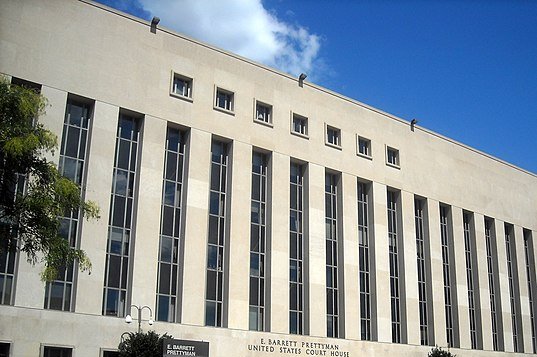A jury on Tuesday at the D.C. federal courthouse found lawyer Michael Sussman, who has ties to Hillary Clinton's presidential campaign, not guilty of lying to the FBI in 2016. File Photo by AgnosticPreachersKid/
Wikimedia Commons
May 31 (UPI) -- Michael Sussmann, an attorney for Hillary Clinton's 2016 presidential campaign, was acquitted Tuesday on a felony charge of lying to the FBI about allegations against Donald Trump.
"Justice ultimately prevailed in my case," Sussmann said outside court, The Washington Post reported. "I'm looking forward to getting back to the work I love."
The acquittal was a loss for Special Counsel John Durham, a Trump administration appointed special counsel, who produced an indictment against Sussmann nearly three years ago.
The indictment said that Sussman lied to the FBI during a Sept. 19, 2016, meeting, about his ties to Clinton presidential campaign when he was alleging that the Trump organization was communicating with Kremlin-linked Alfa Bank through a secret communications channel.
On Tuesday, 12 jurors in D.C. federal court voted unanimously to find Sussmann not guilty.
"While we are disappointed in the outcome, we respect the jury's decision and thank them for their service," Durham said in a statement to the Post.
The case stemmed from Sussmann, who is also a prominent cybersecurity lawyer, bringing suspicions from odd Internet data that cybersecurity researchers found in 2016.
The researchers said the data might have reflected the secret communications channel between Trump and Alfa Bank, but the FBI looked at the suspicions and dismissed them.
Prosecutors alleged that Sussmann lied as part of a larger scheme by Clinton loyalists to use the FBI and news reporters to launch a last-minute revelation to sway the election against Donald Trump and in her favor.
But Sussmann's attorney, Sean Berkowitz, argued that prosecutor's argument was an effort to turn a 30-minute meeting over five years ago into a "giant political conspiracy theory."
Sussmann's attorneys also argued that this effort was just a distraction since the FBI had already opened its inquiry into Russian interference in the 2016 election on other grounds, and the final report by special counsel, Robert Mueller, didn't mention Alfa Bank suspicions.
The case rested on the question of whether Sussmann lied about his client and whether that lie was relevant to the FBI investigation.
Berkowitz said that witness testimony showed the Clinton campaign didn't want the Alfa Bank allegations taken to the FBI since they preferred a news story about an investigation and feared an investigation could complicate or delay the story.
"There is a difference," Berkowitz said, "between having a client, and doing something on their behalf," the Post reported.
"Opposition research is not illegal," he added, and if it were "the jails of Washington, D.C. would be teeming over."
The FBI lawyer that Sussmann met with in 2016, James Baker, was a key witness, who said that Sussmann told him he was not acting on behalf of a client and if he had known, he would have perhaps acted differently, but Sussmann's attorneys challenged his credibility.
Baker said that Sussmann was representing cybersecurity clients in one interview and in another said he couldn't remember that part of the talk, according to Sussmann's attorneys.
On the witness stand, Baker said he couldn't remember 116 times, according to Berkowitz.
A jury forewoman told the Post "politics were not a factor."
"Personally, I don't think it should have been prosecuted," she added.
The case ultimately came down to the jurors decision despite Sussmann filing a motion earlier this year to have the case dismissed, saying Baker was aware the Democratic National Committee was a client of his. In the motion, he also argued that the FBI would still have investigated suspicious computer activity if it had come directly from Clinton.















